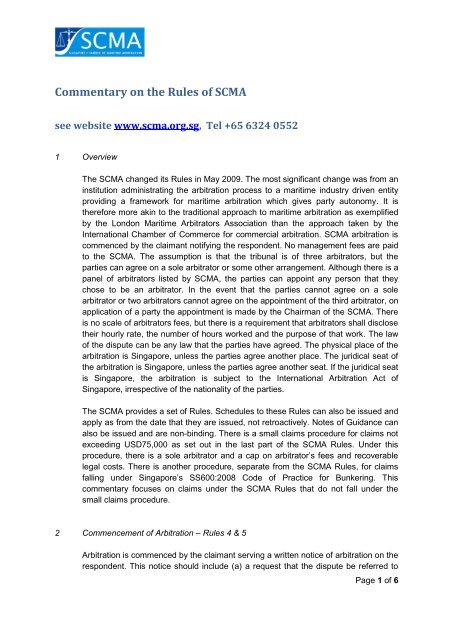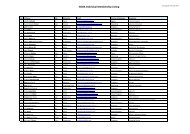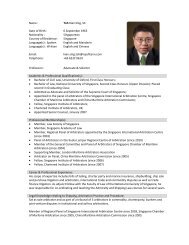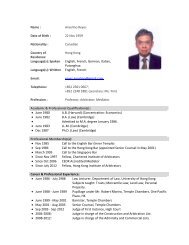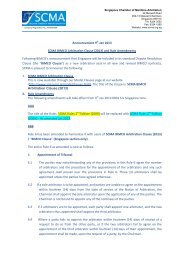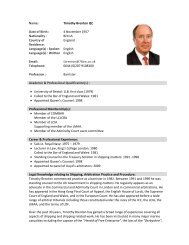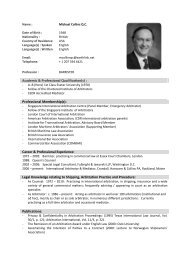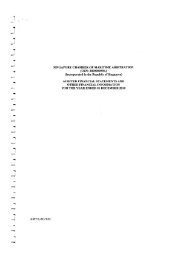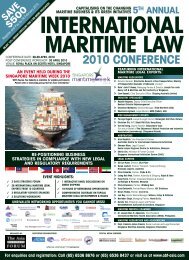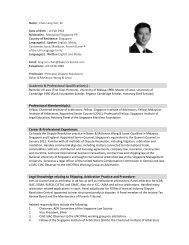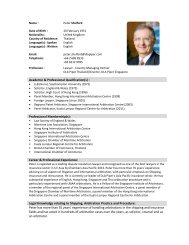Commentary on the Rules of SCMA
Commentary on the Rules of SCMA
Commentary on the Rules of SCMA
Create successful ePaper yourself
Turn your PDF publications into a flip-book with our unique Google optimized e-Paper software.
<str<strong>on</strong>g>Commentary</str<strong>on</strong>g> <strong>on</strong> <strong>the</strong> <strong>Rules</strong> <strong>of</strong> <strong>SCMA</strong><br />
see website www.scma.org.sg, Tel +65 6324 0552<br />
1 Overview<br />
The <strong>SCMA</strong> changed its <strong>Rules</strong> in May 2009. The most significant change was from an<br />
instituti<strong>on</strong> administrating <strong>the</strong> arbitrati<strong>on</strong> process to a maritime industry driven entity<br />
providing a framework for maritime arbitrati<strong>on</strong> which gives party aut<strong>on</strong>omy. It is<br />
<strong>the</strong>refore more akin to <strong>the</strong> traditi<strong>on</strong>al approach to maritime arbitrati<strong>on</strong> as exemplified<br />
by <strong>the</strong> L<strong>on</strong>d<strong>on</strong> Maritime Arbitrators Associati<strong>on</strong> than <strong>the</strong> approach taken by <strong>the</strong><br />
Internati<strong>on</strong>al Chamber <strong>of</strong> Commerce for commercial arbitrati<strong>on</strong>. <strong>SCMA</strong> arbitrati<strong>on</strong> is<br />
commenced by <strong>the</strong> claimant notifying <strong>the</strong> resp<strong>on</strong>dent. No management fees are paid<br />
to <strong>the</strong> <strong>SCMA</strong>. The assumpti<strong>on</strong> is that <strong>the</strong> tribunal is <strong>of</strong> three arbitrators, but <strong>the</strong><br />
parties can agree <strong>on</strong> a sole arbitrator or some o<strong>the</strong>r arrangement. Although <strong>the</strong>re is a<br />
panel <strong>of</strong> arbitrators listed by <strong>SCMA</strong>, <strong>the</strong> parties can appoint any pers<strong>on</strong> that <strong>the</strong>y<br />
chose to be an arbitrator. In <strong>the</strong> event that <strong>the</strong> parties cannot agree <strong>on</strong> a sole<br />
arbitrator or two arbitrators cannot agree <strong>on</strong> <strong>the</strong> appointment <strong>of</strong> <strong>the</strong> third arbitrator, <strong>on</strong><br />
applicati<strong>on</strong> <strong>of</strong> a party <strong>the</strong> appointment is made by <strong>the</strong> Chairman <strong>of</strong> <strong>the</strong> <strong>SCMA</strong>. There<br />
is no scale <strong>of</strong> arbitrators fees, but <strong>the</strong>re is a requirement that arbitrators shall disclose<br />
<strong>the</strong>ir hourly rate, <strong>the</strong> number <strong>of</strong> hours worked and <strong>the</strong> purpose <strong>of</strong> that work. The law<br />
<strong>of</strong> <strong>the</strong> dispute can be any law that <strong>the</strong> parties have agreed. The physical place <strong>of</strong> <strong>the</strong><br />
arbitrati<strong>on</strong> is Singapore, unless <strong>the</strong> parties agree ano<strong>the</strong>r place. The juridical seat <strong>of</strong><br />
<strong>the</strong> arbitrati<strong>on</strong> is Singapore, unless <strong>the</strong> parties agree ano<strong>the</strong>r seat. If <strong>the</strong> juridical seat<br />
is Singapore, <strong>the</strong> arbitrati<strong>on</strong> is subject to <strong>the</strong> Internati<strong>on</strong>al Arbitrati<strong>on</strong> Act <strong>of</strong><br />
Singapore, irrespective <strong>of</strong> <strong>the</strong> nati<strong>on</strong>ality <strong>of</strong> <strong>the</strong> parties.<br />
The <strong>SCMA</strong> provides a set <strong>of</strong> <strong>Rules</strong>. Schedules to <strong>the</strong>se <strong>Rules</strong> can also be issued and<br />
apply as from <strong>the</strong> date that <strong>the</strong>y are issued, not retroactively. Notes <strong>of</strong> Guidance can<br />
also be issued and are n<strong>on</strong>-binding. There is a small claims procedure for claims not<br />
exceeding USD75,000 as set out in <strong>the</strong> last part <strong>of</strong> <strong>the</strong> <strong>SCMA</strong> <strong>Rules</strong>. Under this<br />
procedure, <strong>the</strong>re is a sole arbitrator and a cap <strong>on</strong> arbitrator’s fees and recoverable<br />
legal costs. There is ano<strong>the</strong>r procedure, separate from <strong>the</strong> <strong>SCMA</strong> <strong>Rules</strong>, for claims<br />
falling under Singapore’s SS600:2008 Code <strong>of</strong> Practice for Bunkering. This<br />
commentary focuses <strong>on</strong> claims under <strong>the</strong> <strong>SCMA</strong> <strong>Rules</strong> that do not fall under <strong>the</strong><br />
small claims procedure.<br />
2 Commencement <strong>of</strong> Arbitrati<strong>on</strong> – <strong>Rules</strong> 4 & 5<br />
Arbitrati<strong>on</strong> is commenced by <strong>the</strong> claimant serving a written notice <strong>of</strong> arbitrati<strong>on</strong> <strong>on</strong> <strong>the</strong><br />
resp<strong>on</strong>dent. This notice should include (a) a request that <strong>the</strong> dispute be referred to<br />
Page 1 <strong>of</strong> 6
arbitrati<strong>on</strong>, (b) <strong>the</strong> identity <strong>of</strong> <strong>the</strong> parties to <strong>the</strong> dispute, (c) reference to <strong>the</strong> arbitrati<strong>on</strong><br />
provisi<strong>on</strong> in <strong>the</strong> c<strong>on</strong>tract, (d) reference to <strong>the</strong> c<strong>on</strong>tract relating to <strong>the</strong> dispute, (e)<br />
proposal <strong>on</strong> number <strong>of</strong> arbitrators and (f) <strong>the</strong> name(s) <strong>of</strong> <strong>the</strong> claimant’s proposed<br />
arbitrators. It will be noted that arbitrati<strong>on</strong> is commenced without an arbitrator actually<br />
being appointed.<br />
Within 14 days <strong>of</strong> receipt <strong>of</strong> <strong>the</strong> notice <strong>of</strong> arbitrati<strong>on</strong> <strong>the</strong> resp<strong>on</strong>dent shall serve <strong>on</strong> <strong>the</strong><br />
claimant a comment in resp<strong>on</strong>se to any <strong>of</strong> <strong>the</strong> proposals c<strong>on</strong>tained in <strong>the</strong> notice <strong>of</strong><br />
arbitrati<strong>on</strong> and <strong>the</strong> name(s) <strong>of</strong> <strong>the</strong> resp<strong>on</strong>dent’s proposed arbitrator(s).<br />
It will be noted that <strong>the</strong>re is no need to inform <strong>the</strong> <strong>SCMA</strong> when <strong>the</strong> arbitrati<strong>on</strong> is<br />
commenced. However, <strong>the</strong> tribunal is required to inform <strong>the</strong> <strong>SCMA</strong> <strong>of</strong> its<br />
appointment, see paragraph 3 below.<br />
3 The Tribunal – <strong>Rules</strong> 6,7,15,16,17,18 & 43<br />
Unless o<strong>the</strong>rwise agreed <strong>the</strong> tribunal is <strong>of</strong> three arbitrators. Each party is to appoint<br />
<strong>on</strong>e arbitrator and <strong>the</strong> two arbitrators are to appoint a third. The parties can agree a<br />
sole arbitrator or any o<strong>the</strong>r number <strong>of</strong> arbitrators and also <strong>the</strong> procedure for<br />
appointment. If an arbitrator to be appointed cannot be agreed up<strong>on</strong> after 30 days,<br />
<strong>on</strong>e <strong>of</strong> <strong>the</strong> parties can apply to <strong>the</strong> Chairman <strong>of</strong> <strong>SCMA</strong> to appoint an arbitrator. If<br />
<strong>the</strong>re are more than two parties in <strong>the</strong> arbitrati<strong>on</strong>, <strong>the</strong> parties shall agree a procedure<br />
for appointing <strong>the</strong> tribunal with 21 days <strong>of</strong> <strong>the</strong> service <strong>of</strong> <strong>the</strong> notice <strong>of</strong> arbitrati<strong>on</strong> and if<br />
<strong>the</strong> parties are unable to do so, <strong>the</strong> tribunal is appointed by <strong>the</strong> Chairman <strong>of</strong> <strong>SCMA</strong>.<br />
The appointment fee <strong>of</strong> an arbitrator is SGD 375 payable to <strong>the</strong> arbitrator; if <strong>the</strong><br />
Chairman <strong>of</strong> <strong>SCMA</strong> is required to appoint an arbitrator <strong>the</strong>re is a charge by <strong>the</strong><br />
<strong>SCMA</strong> <strong>of</strong> SGD 750.<br />
Within seven days <strong>of</strong> its appointment, <strong>the</strong> tribunal shall inform <strong>the</strong> <strong>SCMA</strong> <strong>of</strong> its<br />
appointment al<strong>on</strong>g with a brief nature <strong>of</strong> <strong>the</strong> dispute, without disclosing <strong>the</strong> parties’<br />
names. The purpose <strong>of</strong> this is so <strong>the</strong> <strong>SCMA</strong> can keep statistics <strong>on</strong> arbitrati<strong>on</strong>s<br />
c<strong>on</strong>ducted under its <strong>Rules</strong>. Also <strong>the</strong> <strong>SCMA</strong> is available to be c<strong>on</strong>tacted by a party or<br />
an arbitrator to assist informally to resolve any inappropriate delays in <strong>the</strong> process <strong>of</strong><br />
<strong>the</strong> arbitrati<strong>on</strong> or <strong>the</strong> publicati<strong>on</strong> <strong>of</strong> <strong>the</strong> Award. The informati<strong>on</strong> to be supplied to <strong>the</strong><br />
<strong>SCMA</strong> is published <strong>on</strong> its website, but at time <strong>of</strong> writing c<strong>on</strong>sists <strong>of</strong> <strong>the</strong> following: date<br />
<strong>of</strong> commencement <strong>of</strong> arbitrati<strong>on</strong>, names <strong>of</strong> <strong>the</strong> arbitrators, nati<strong>on</strong>ality <strong>of</strong> <strong>the</strong> parties,<br />
<strong>the</strong> type <strong>of</strong> dispute and, if known, <strong>the</strong> approximate amount in dispute.<br />
The Tribunal c<strong>on</strong>ducting an arbitrati<strong>on</strong> shall be and remain at all times independent<br />
and impartial. A prospective arbitrator is required to advise any party seeking to<br />
appoint him <strong>of</strong> any circumstances likely to give rise to justifiable doubts as to<br />
impartiality or independence and if nominated or appointed to disclose such<br />
circumstances to all parties.<br />
Page 2 <strong>of</strong> 6
The appointment <strong>of</strong> an arbitrator can be challenged if <strong>the</strong>re are justifiable doubts as<br />
to impartiality or independence or he does not possess <strong>the</strong> qualificati<strong>on</strong>s required by<br />
agreement <strong>of</strong> <strong>the</strong> parties. The challenge must be made within 14 days from <strong>the</strong><br />
appointment <strong>of</strong> <strong>the</strong> arbitrator or within 14 days after <strong>the</strong> circumstances <strong>on</strong> which <strong>the</strong><br />
challenge is based become known to <strong>the</strong> party challenging. If a party does not agree<br />
to <strong>the</strong> challenge or <strong>the</strong> arbitrator does not withdraw, <strong>the</strong> party making <strong>the</strong> challenge<br />
can refer <strong>the</strong> matter to <strong>the</strong> Chairman <strong>of</strong> <strong>the</strong> <strong>SCMA</strong> for his decisi<strong>on</strong>.<br />
A court <strong>of</strong> competent jurisdicti<strong>on</strong> may, <strong>on</strong> <strong>the</strong> applicati<strong>on</strong> <strong>of</strong> a party, remove an<br />
arbitrator who (i) is physically or mentally incapable <strong>of</strong> c<strong>on</strong>ducting <strong>the</strong> proceedings or<br />
where <strong>the</strong>re are justifiable doubts as to his ability to do so, or (ii) has refused or failed<br />
to use all reas<strong>on</strong>able dispatch in c<strong>on</strong>ducting <strong>the</strong> arbitrati<strong>on</strong> or making an Award.<br />
The <strong>SCMA</strong> maintains a panel <strong>of</strong> arbitrators, details <strong>of</strong> which are <strong>on</strong> <strong>the</strong> <strong>SCMA</strong><br />
website. It is not required that <strong>the</strong> parties use a pers<strong>on</strong> <strong>on</strong> <strong>the</strong> panel and <strong>the</strong>y may<br />
chose any<strong>on</strong>e <strong>the</strong>y wish. The criteria for membership <strong>of</strong> <strong>the</strong> <strong>SCMA</strong> panel is given <strong>on</strong><br />
<strong>the</strong> <strong>SCMA</strong> website and is that <strong>the</strong> applicant: (i) has been engaged for at least ten<br />
years in a resp<strong>on</strong>sible positi<strong>on</strong> or positi<strong>on</strong>s in <strong>on</strong>e or more areas <strong>of</strong> <strong>the</strong> maritime<br />
industry, ei<strong>the</strong>r commercial, technical or legal, (ii) has knowledge <strong>of</strong> law relating to<br />
maritime, arbitrati<strong>on</strong> practice and procedure, and (iii) dem<strong>on</strong>strates an ability to draft<br />
reas<strong>on</strong>ed awards in maritime. There are provisi<strong>on</strong>s to enable waiver <strong>of</strong> <strong>the</strong> criteria in<br />
appropriate cases. Applicants are approved by an electi<strong>on</strong> sub-committee.<br />
The <strong>SCMA</strong> <strong>Rules</strong> provide that <strong>the</strong> members <strong>of</strong> <strong>the</strong> Tribunal shall not be liable for any<br />
act or omissi<strong>on</strong> in c<strong>on</strong>necti<strong>on</strong> with <strong>the</strong> arbitrati<strong>on</strong>, unless <strong>the</strong> act <strong>of</strong> omissi<strong>on</strong> is shown<br />
to have been in bad faith.<br />
4 Tribunal’s fees – <strong>Rules</strong> 12 & 13<br />
The parties have joint and several liability for fees, although <strong>the</strong> initial payment is<br />
made by <strong>the</strong> appointing party. An arbitrator may require payment <strong>of</strong> his fees and<br />
expenses at appropriate intervals, but not less than every three m<strong>on</strong>ths. If <strong>the</strong> fees<br />
and expenses remain unpaid for more than 28 days after payment is requested, an<br />
arbitrator may resign after giving 14 days notice <strong>of</strong> this to all parties and payment<br />
remains unpaid. The Tribunal is entitled to security for estimated fees and expenses.<br />
The form <strong>of</strong> security is at <strong>the</strong> Tribunal’s discreti<strong>on</strong> and security is to be provided no<br />
later than 21 days before <strong>the</strong> start <strong>of</strong> any oral hearing intended to lead to an Award,<br />
or in <strong>the</strong> case <strong>of</strong> a documents <strong>on</strong>ly arbitrati<strong>on</strong> not later than immediately before <strong>the</strong><br />
Tribunal starts work with a view to producing an Award. The Tribunal can require a<br />
shorter period. There is a standard booking fee <strong>of</strong> SGD 1,125 per day per arbitrator<br />
for an oral hearing. If <strong>the</strong> hearing goes ahead this amount is <strong>of</strong>fset against <strong>the</strong><br />
arbitrator’s fee.<br />
Page 3 <strong>of</strong> 6
5 Law <strong>of</strong> Dispute, Juridical Seat <strong>of</strong> Arbitrati<strong>on</strong>, Place <strong>of</strong> Arbitrati<strong>on</strong> – <strong>Rules</strong> 2, 21 & 22<br />
The Tribunal shall apply <strong>the</strong> law agreed by <strong>the</strong> parties as being applicable to <strong>the</strong><br />
substance <strong>of</strong> <strong>the</strong> dispute. Failing such agreement, <strong>the</strong> Tribunal shall apply <strong>the</strong> law<br />
determined by <strong>the</strong> c<strong>on</strong>flict <strong>of</strong> laws which <strong>the</strong> Tribunal c<strong>on</strong>siders applicable.<br />
The juridical seat <strong>of</strong> <strong>the</strong> arbitrati<strong>on</strong> is Singapore, unless <strong>the</strong> parties agree o<strong>the</strong>rwise.<br />
The Tribunal does not have <strong>the</strong> power to determine <strong>the</strong> juridical seat – it is for <strong>the</strong><br />
parties to decide. If <strong>the</strong> juridical seat is Singapore, under <strong>the</strong> <strong>SCMA</strong> <strong>Rules</strong> <strong>the</strong><br />
Internati<strong>on</strong>al Arbitrati<strong>on</strong> Act <strong>of</strong> Singapore (Cap 143 A) applies irrespective <strong>of</strong> <strong>the</strong><br />
nati<strong>on</strong>ality <strong>of</strong> <strong>the</strong> parties. This Act applies <strong>the</strong> UNICTRAL Model Law <strong>on</strong> Arbitrati<strong>on</strong><br />
1985, with certain modificati<strong>on</strong>s. A commentary <strong>on</strong> <strong>the</strong> Act can be found <strong>on</strong> <strong>the</strong><br />
<strong>SCMA</strong> website. One point to note is that unlike England’s Arbitrati<strong>on</strong> Act 1996, <strong>the</strong>re<br />
is no appeal <strong>on</strong> an error <strong>of</strong> law. If <strong>the</strong> parties do wish to have an appeal <strong>on</strong> error <strong>of</strong><br />
law, it is open to <strong>the</strong>m to agree to <strong>the</strong> juridical seat being England or some o<strong>the</strong>r<br />
jurisdicti<strong>on</strong> which gives effect to <strong>the</strong>ir wishes or to agree that <strong>the</strong> arbitrati<strong>on</strong> shall be<br />
subject to <strong>the</strong> Arbitrati<strong>on</strong> Act <strong>of</strong> Singapore (Cap 10). This Act normally applies when<br />
both parties are Singaporean, but parties can agree that it shall apply when <strong>the</strong><br />
parties are internati<strong>on</strong>al; <strong>the</strong> Act permits an appeal <strong>on</strong> error <strong>of</strong> law. A commentary <strong>on</strong><br />
this Act can also be found <strong>on</strong> <strong>the</strong> <strong>SCMA</strong> website.<br />
The physical place <strong>of</strong> <strong>the</strong> arbitrati<strong>on</strong> is Singapore unless <strong>the</strong> parties agree ano<strong>the</strong>r<br />
place. The Tribunal does not have <strong>the</strong> power to determine <strong>the</strong> physical place <strong>of</strong> <strong>the</strong><br />
arbitrati<strong>on</strong> – it is for <strong>the</strong> parties to decide. Maxwell Chambers in Singapore has<br />
recently opened as a dispute resoluti<strong>on</strong> facility. The building has 22 hearing rooms,<br />
video c<strong>on</strong>ferencing facilities and extensive translati<strong>on</strong> services. The website <strong>of</strong><br />
Maxwell Chamber is www.maxwell-chambers.com. As to language, <strong>the</strong> <strong>SCMA</strong> <strong>Rules</strong><br />
call for <strong>the</strong> arbitrati<strong>on</strong> to be in English, unless <strong>the</strong> parties o<strong>the</strong>rwise agree.<br />
6 Case Procedure – <strong>Rules</strong> 8,9,25,29 & 30<br />
Under <strong>the</strong> new <strong>Rules</strong>, <strong>the</strong> <strong>SCMA</strong> as an organisati<strong>on</strong> does not get involved in <strong>the</strong> case<br />
procedure and it is left <strong>the</strong> parties and <strong>the</strong> Tribunal. Unless o<strong>the</strong>rwise agreed, case<br />
statements must be served at 30 day intervals, commencing with a Statement <strong>of</strong> <strong>the</strong><br />
Claimant’s Case within 30 days after <strong>the</strong> appointment <strong>of</strong> <strong>the</strong> Tribunal. The case<br />
statements are required to c<strong>on</strong>tain <strong>the</strong> fullest particulars <strong>of</strong> <strong>the</strong> party’s claim or<br />
defence. If <strong>the</strong>re is a failure to serve <strong>the</strong> Statement <strong>of</strong> <strong>the</strong> Claimant’s Case or <strong>the</strong><br />
Resp<strong>on</strong>dent’s Defence, <strong>the</strong> Tribunal can terminate <strong>the</strong> proceedings in <strong>the</strong> event <strong>of</strong><br />
<strong>the</strong> former and make an Award in <strong>the</strong> event <strong>of</strong> <strong>the</strong> latter. Within 14 days <strong>of</strong> <strong>the</strong> time<br />
fixed for <strong>the</strong> Statement <strong>of</strong> <strong>the</strong> Claimant’s Reply, a Questi<strong>on</strong>naire must be served by<br />
each party detailing various matters regarding procedure, presenting evidence,<br />
length <strong>of</strong> hearing and costs.<br />
Unless <strong>the</strong> parties have agreed documents <strong>on</strong>ly, <strong>the</strong> Tribunal shall hold a hearing for<br />
<strong>the</strong> presentati<strong>on</strong> <strong>of</strong> evidence by witnesses. However <strong>the</strong> testim<strong>on</strong>y <strong>of</strong> witnesses can<br />
Page 4 <strong>of</strong> 6
e submitted in written form and <strong>the</strong> Tribunal may place such weight <strong>on</strong> <strong>the</strong> written<br />
testim<strong>on</strong>y as it thinks fit.<br />
No party can adduce expert evidence without <strong>the</strong> leave <strong>of</strong> <strong>the</strong> Tribunal. Unless<br />
o<strong>the</strong>rwise agreed by <strong>the</strong> parties, <strong>the</strong> Tribunal may appoint <strong>on</strong>e or more experts to<br />
report to <strong>the</strong> Tribunal <strong>on</strong> specific issues and <strong>the</strong> Tribunal may require any party to<br />
give <strong>the</strong> expert relevant informati<strong>on</strong> or to produce or provide access to, relevant<br />
documents, goods or property for inspecti<strong>on</strong> by <strong>the</strong> expert.<br />
7 Jurisdicti<strong>on</strong> and Powers <strong>of</strong> <strong>the</strong> Tribunal – <strong>Rules</strong> 20 & 32<br />
The Tribunal has jurisdicti<strong>on</strong> to rule <strong>on</strong> its own jurisdicti<strong>on</strong>. Under Singapore’s<br />
Internati<strong>on</strong>al Arbitrati<strong>on</strong> Act, an aggrieved party can appeal to <strong>the</strong> Singapore High<br />
Court within 30 days. The Tribunal may make an Award notwithstanding <strong>the</strong> failure <strong>of</strong><br />
a party to comply with <strong>the</strong> <strong>Rules</strong> or <strong>the</strong> Tribunal’s orders. The Tribunal has wide<br />
powers to permit parties to amend claims and time limits, to order parties to produce<br />
documents or make property available for inspecti<strong>on</strong> and samples to be taken.<br />
If <strong>the</strong> parties agree, <strong>the</strong> Tribunal has power to join o<strong>the</strong>r parties to <strong>the</strong> arbitrati<strong>on</strong>.<br />
Where two or more arbitrati<strong>on</strong>s raise comm<strong>on</strong> issues <strong>of</strong> fact or law, <strong>the</strong> respective<br />
Tribunals can direct <strong>the</strong> arbitrati<strong>on</strong>s to be heard c<strong>on</strong>currently and give directi<strong>on</strong>s<br />
appropriate in <strong>the</strong> interests <strong>of</strong> fairness, ec<strong>on</strong>omy and speed, including admissi<strong>on</strong> <strong>of</strong><br />
evidence given in <strong>on</strong>e arbitrati<strong>on</strong> be admitted in <strong>the</strong> o<strong>the</strong>r.<br />
8 The Award – Rule 35,36,37,38 & 40<br />
Unless <strong>the</strong> parties o<strong>the</strong>rwise agree, <strong>the</strong> Tribunal shall make an Award in writing<br />
within 3 m<strong>on</strong>ths from <strong>the</strong> date that proceedings are closed and shall state reas<strong>on</strong>s for<br />
<strong>the</strong> Award. Interim Awards and separate Awards <strong>on</strong> different issues can be made.<br />
The Award shall be signed by all members <strong>of</strong> <strong>the</strong> Tribunal or a majority <strong>of</strong> <strong>the</strong><br />
Tribunal. If an arbitrator does not sign <strong>the</strong> Award, <strong>the</strong> signatures <strong>of</strong> <strong>the</strong> majority shall<br />
be sufficient, provided that <strong>the</strong> reas<strong>on</strong> for <strong>the</strong> omitted signature is stated. Members <strong>of</strong><br />
<strong>the</strong> Tribunal need not meet toge<strong>the</strong>r to sign <strong>the</strong> Award. There are provisi<strong>on</strong>s enabling<br />
a party to request, within 30 days after receipt <strong>of</strong> <strong>the</strong> main Award, an additi<strong>on</strong>al<br />
Award as to claims presented but omitted from <strong>the</strong> main Award. Also within <strong>the</strong> same<br />
time period, unless ano<strong>the</strong>r time period has been agreed between <strong>the</strong> parties, a party<br />
may request a correcti<strong>on</strong> <strong>of</strong> any clerical or computati<strong>on</strong> errors.<br />
As so<strong>on</strong> as practicable after an Award has been made, <strong>the</strong> parties shall be notified<br />
al<strong>on</strong>g with <strong>the</strong> amount <strong>of</strong> <strong>the</strong> fees and expenses <strong>of</strong> <strong>the</strong> Tribunal. The Award shall<br />
specify <strong>the</strong> extent to which a party shall bear <strong>the</strong>se fees and expenses. The Award<br />
can also include <strong>the</strong> extent to which costs <strong>of</strong> <strong>on</strong>e party shall be paid by <strong>the</strong> o<strong>the</strong>r<br />
party. The Award can fix <strong>the</strong> amount <strong>of</strong> <strong>the</strong>se costs or direct that <strong>the</strong> costs be taxed if<br />
not agreed. The Tribunal may make an Award in any currency it c<strong>on</strong>siders just and<br />
award simple or compound interest.<br />
Page 5 <strong>of</strong> 6
The parties and <strong>the</strong> Tribunal shall at all times treat all matters relating to <strong>the</strong><br />
arbitrati<strong>on</strong> and <strong>the</strong> Award as c<strong>on</strong>fidential. The Tribunal shall send a copy <strong>of</strong> <strong>the</strong><br />
Award to <strong>the</strong> <strong>SCMA</strong> within 14 days from <strong>the</strong> date <strong>of</strong> collecti<strong>on</strong> <strong>of</strong> <strong>the</strong> Award by <strong>on</strong>e <strong>of</strong><br />
<strong>the</strong> parties, with <strong>the</strong> identity <strong>of</strong> <strong>the</strong> parties removed. The <strong>SCMA</strong> can publish <strong>the</strong><br />
Award, provided no party objects within 30 days <strong>of</strong> <strong>the</strong> <strong>SCMA</strong> giving notice <strong>of</strong> its<br />
intenti<strong>on</strong> to publish <strong>the</strong> Award. The publicati<strong>on</strong> will be redacted to preserve<br />
an<strong>on</strong>ymity as regards <strong>the</strong> identity <strong>of</strong> <strong>the</strong> parties, <strong>of</strong> <strong>the</strong>ir legal or o<strong>the</strong>r representatives<br />
and <strong>of</strong> <strong>the</strong> members <strong>of</strong> <strong>the</strong> Tribunal. The <strong>SCMA</strong> sees <strong>the</strong> publicati<strong>on</strong> <strong>of</strong> summaries <strong>of</strong><br />
awards as important for <strong>the</strong> development <strong>of</strong> arbitrati<strong>on</strong> in Singapore and for <strong>the</strong><br />
enhanced knowledge <strong>of</strong> <strong>the</strong> law and <strong>of</strong> arbitrati<strong>on</strong> practice. It is hoped that parties will<br />
agree to publicati<strong>on</strong>, even if in broad terms and after some period has elapsed since<br />
<strong>the</strong> award.<br />
Lee Wai-P<strong>on</strong>g<br />
Executive Director<br />
Updated 17 January 2011<br />
Page 6 <strong>of</strong> 6


